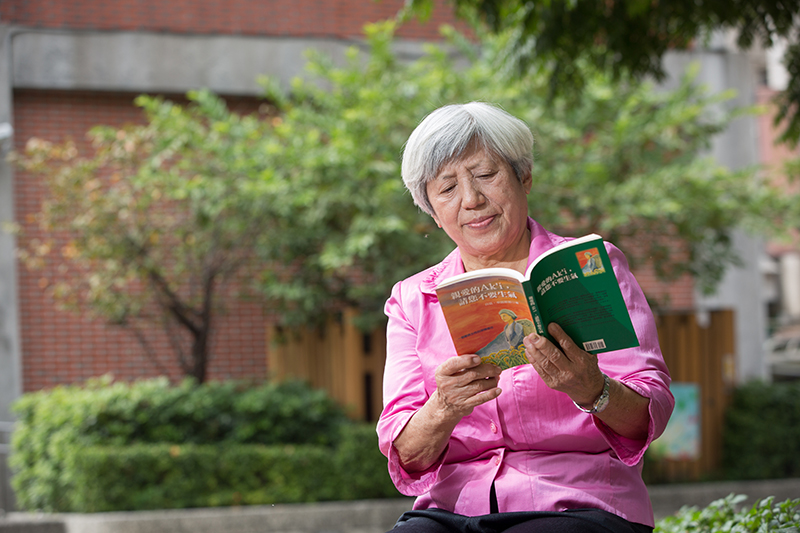
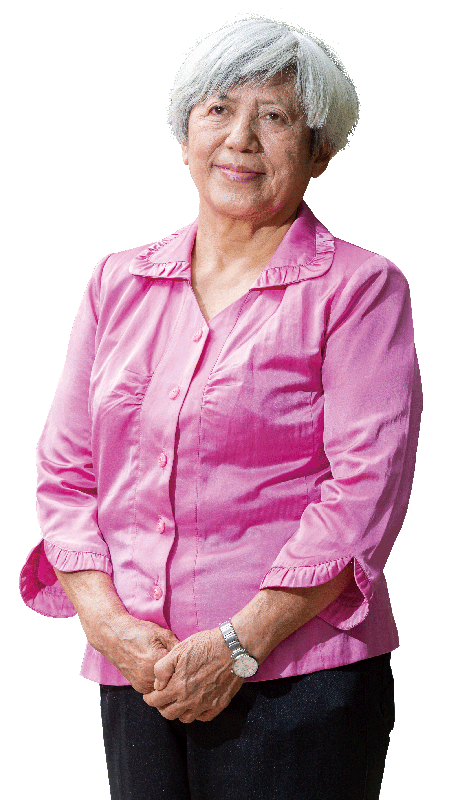
“I write about everything in our indigenous community, the good and the bad, so that further down the road, if people want to learn about the history of our community, they will have something to go by.”
Writer Faisʉ.Mʉkʉnana was originally just a housewife located in northern Taiwan, deeply homesick with no other ways to express her feelings. She wrote relentlessly, documenting and polishing her memory on life back in her indigenous community, turning them into literary gem, and filling in the gap of the recollections on everyday indigenous lives missing from the collective history due to the tumultuous times.
Faisʉ.Mʉkʉnana was born in Lalauya Community, Alishan Township, Chaiyi County. She grew up during a difficult time, when lives were hard for everyone and people had to take on really heavy labor works.
As the oldest daughter in the family, Faisʉ grew up a diligent kid. She would march deep into the mountain with her second aunt to harvest bamboo sheath, or hike 2 to 3 hours through the mountain just to visit the only beauty salon in the entire township. Faisʉ smiled as she recalled, “there was no electricity back then, after the perm solution and hair curlers were applied, we had to walk ourselves over to the fire and squat in front of it to heat up our hair.”
Faisʉ grew up to be a teacher at their community kindergarten. Adults in the family demanded that she marry the person she was arranged for as a child, according to tradition, which really annoyed Faisʉ. Her female cousin once told her, if you marry someone you don’t like, life will be nothing but misery from then on. Unwilling to accept how women cannot make decisions regarding their own marriage, Faisʉ was 24 before she finally decided to marry her military husband from Sichuan, introduced to her by a friend.“Back then, Tsou women rarely marries a puutu (non-indigenous person), this was big news in our community.”
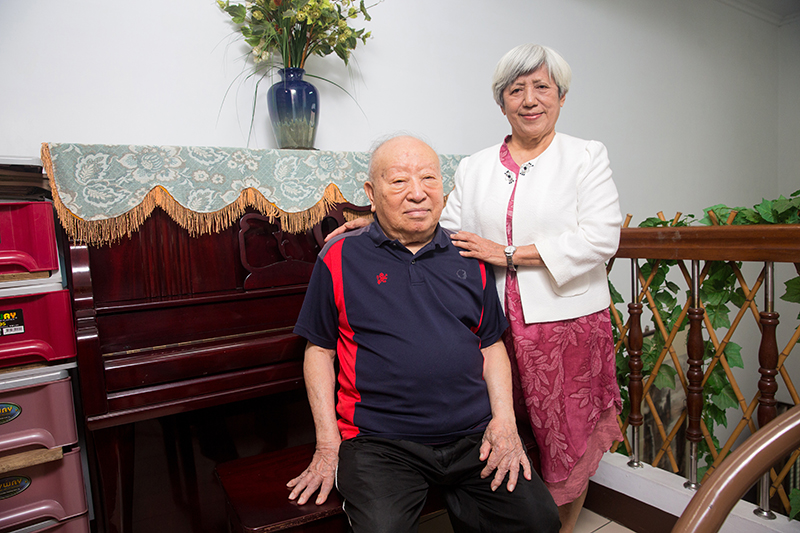
A Tsou Woman,
Extremely Homesick
Growing up, Faisʉ had never traveled more than 5 times to the Chaiyi downtown, but as soon as she got married, she transferred to Penghu with her husband’s troupe. Instead of the lush green in the mountains Faisʉ used to see, she now watched the vast ocean that seemed to lead no where, yet still managed to develop her own pace of life, collecting sea snails along the coast at ebb tide with women from her neighborhood to help make ends meet.
When she got married, the Vietnam war was still on-going, and for quite a long period, the Taiwan troops were frequently on the move. Wherever her husband’s troop moved, faisʉ followed, and with the money tight, they alwys stayed in places with cheat rent. “There wasn’t really anything I couldn’t get used to, I probably would not have fit in in a rich household,” Faisʉ laughed.
Back then, military personnel makes about half the salary of a civil servant or teacher. Faisʉ and her husband moved with their pair of son and daughter from Pingtung, Kaohsiung, Tainan to Taoyuan, before finally buying their own house in Xinzhaung, New Taipei City, in 1988. However life changed, Faisʉ always remained the same, cherishing everything she had.
Faisʉ seemed to be at home wherever life led her, but deep down, she was always homesick for the mountains that nourished her, with details and events from the past in her community becoming ever more polished and glistening as time went by. However, her husband being in the military and always by the book, could not sympathize with Faisʉ’s homesickness. He rarely cared about the customs, routines and life of the Tsou people, and showed absolutely no interest in visiting the community for the Mayasvi, the war ritual.
With no one to share her memory with, Faisʉ having never taken up a job and completely alone away from home, she just could not help being lonely. Every once in a while, she laments, “I know my husband loves me very much, but he will never truly understand the heart of a Tsou woman.”
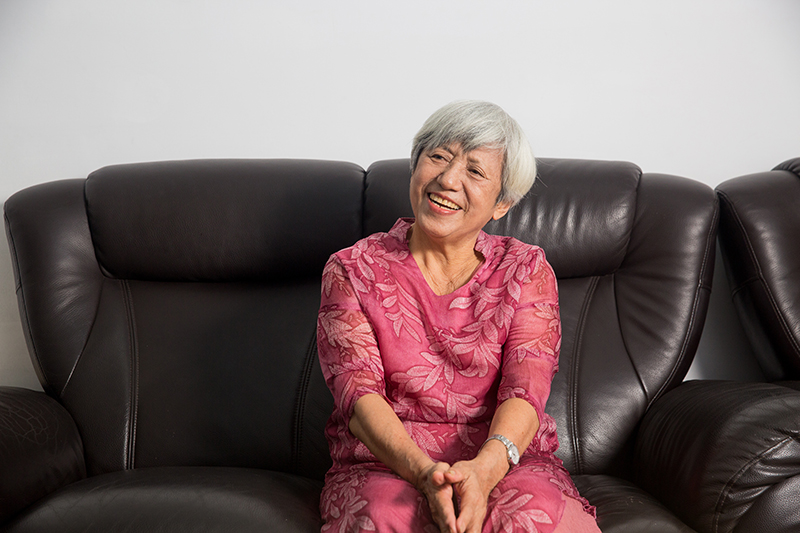
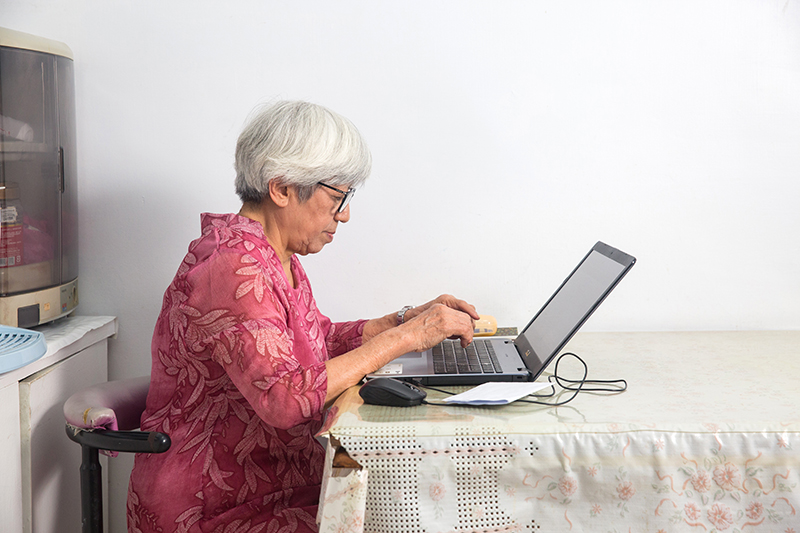
Putting to Words Her Life
Back in the Indigenous Community
Faisʉ may only have a degree in elementary school, but she enjoyed reading. When she was younger, she learnt how to read by reading the Bible, as she got older, she broadened her horizon by reading literature and novels. Encouraged by her god son, Faisʉ signed for a creative writing class at the local community college, and with encouragement from female writer Zeng Xin-Yi in class, she began writing. Memories of her life in the Mount Ali when she was younger became the never-ending source of inspiration for Faisʉ.
“I didn’t know what literature was, I just wrote about all the rustic and homey stuff.” Faisʉ did not that what she wrote was of any significance, but with The Adventures of Tom Sawyer as example, Zeng Xinyi said that if stories about naughty kids can become great literature works, memories of real life and emotions are even more integral to producing literary gems.
Therefore, Faisʉ submitted her article titled Wooden Clogs to the China Motor Indigenous Literature Award. The article talks about a puutu buying out their patch of tung trees to make wooden clogs, the young Faisʉ was heartbroken because the tung trees with white flowers blooming were gone. But she had to accept the reality, because the money meant that her father could build a new house for the family. The Wooden Clogs eventually won the Merit Award - Prose Category, and that filled Faisʉ with confidence. She began writing during her free time between chores, learnt the Cangjie input method, and word by word, she committed the memories of her indigenous community to the computer, with her grandchild on her back.
In 2003, housewife Faisʉ who wrote creatively with her grandchild on her back published her first book, Dear Ak’i, Please Don’t get Mad, and brought to life scenes from a Tsou community deep in the Mount Ali in the 1930s. Hu Tai-Li, researcher at the Institute of Ethnology, Academia Sinica, wrote in the prologue describing Faisʉ’s writing colorful like the wilderness of the forest, which embodied the hardship of labor and the deprivation of food and supplies, “every memory she describes seems to come with a slight heave of sigh.”
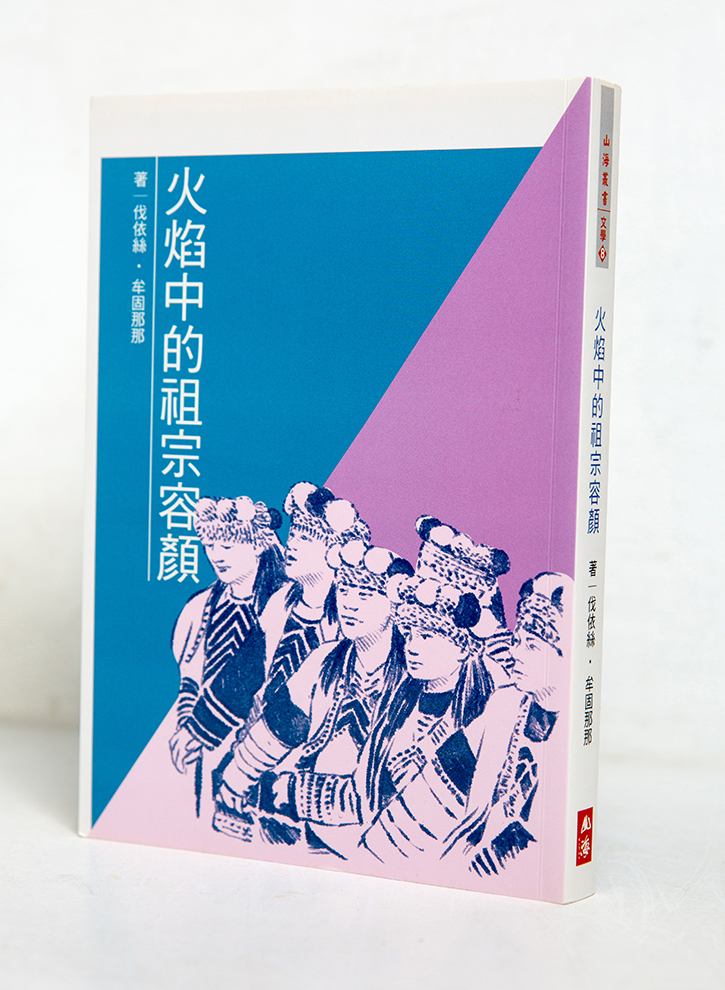
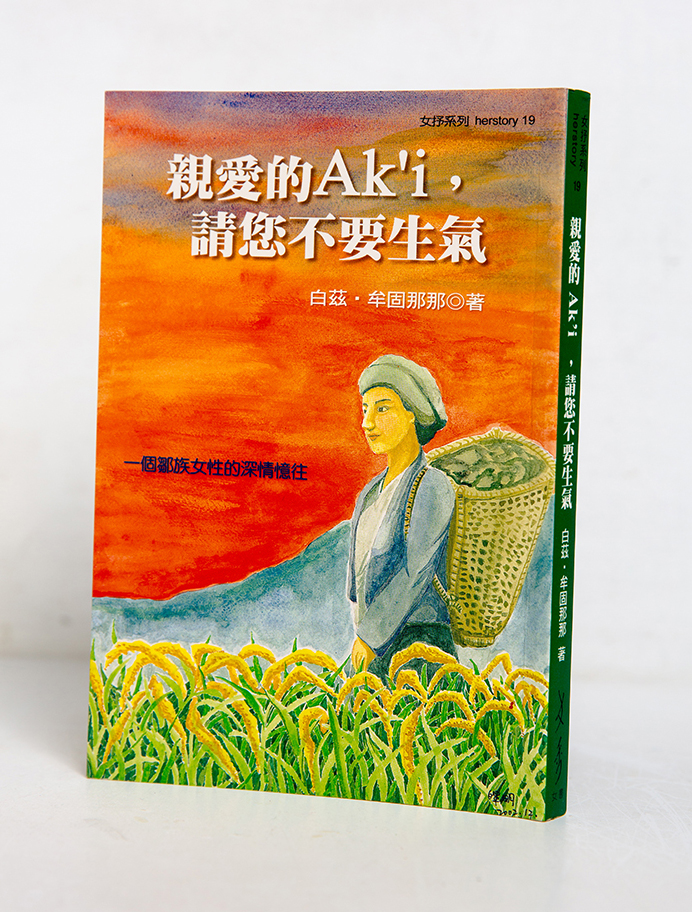
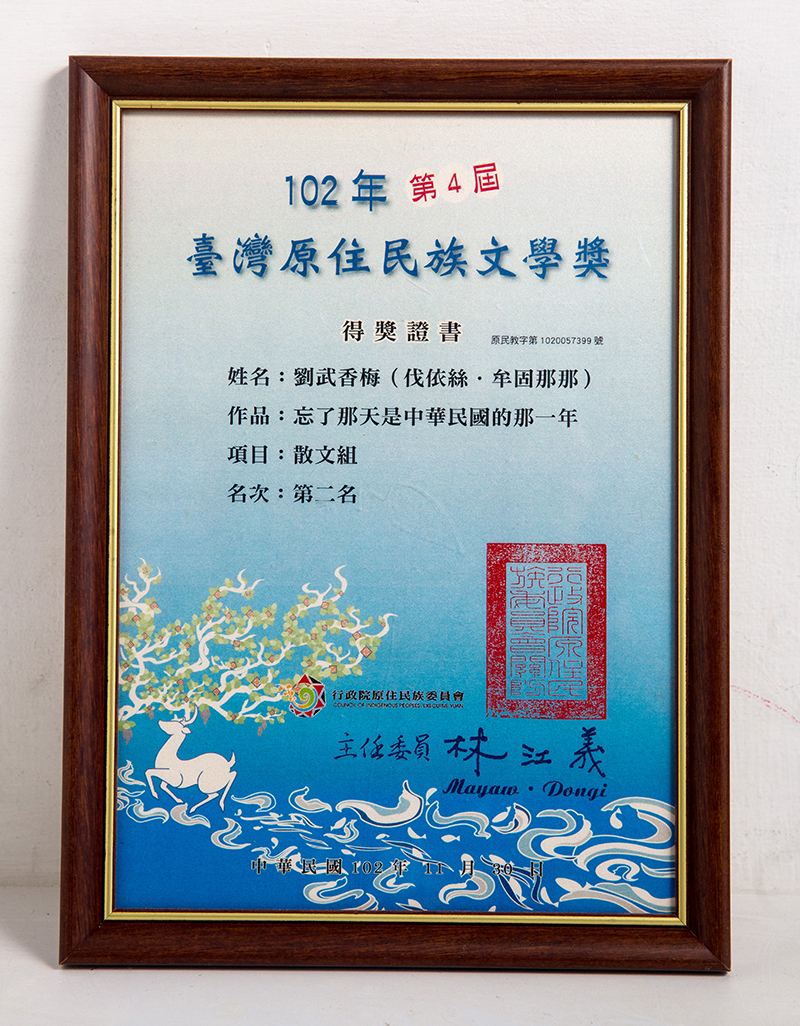
Female Strength Nourished
by the Profoundness of Daily Life
In 2017, Faisʉ published her second book Faces of Ancestors in the Flame. In addition to documenting the lively and amicable anecdotes of life in the indigenous community, her book also depicts, from a nobody’s perspective, life in a Tsou community, how they struggled to survive amidst the political turmoil from late Japanese ruling period to the early years of the Nationalist Government in Taiwan.
“I write about everything in our indigenous community because I want to pass on the history of our family,” Faisʉ says that even though the Tsou people do not have written words, every Tsou child has spent time by the bonfire listening to adults tell stories of the family history. As well developed as the internet is nowadays, family history often tend to be neglected and buried. Faisʉ encourages indigenous women to start writing, and document everything in their lives. Writing in Chinese may lack the vibe unique to indigenous peoples, but at least the history and context of indigenous peoples will be eternal.
Having lived through regime changes and the White Terror, experienced loneliness of being away from home, and witnessed displacements caused by climate change, there is no judgement in Faisʉ’s writing. Approaching 80, she continues to keep a record of life from the perspective of a regular nobody. Every time she recalls the past, the soft and gentle heart of this Tsou woman finds the strength to march forward with even more determination.
